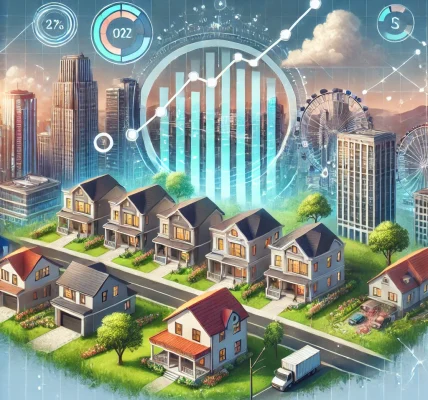Introduction
The real estate industry has long been associated with paperwork-heavy transactions, lengthy processes, and high costs due to intermediaries like brokers, lawyers, and banks. However, blockchain technology is changing the landscape by offering secure, transparent, and decentralized solutions. By reducing fraud, increasing efficiency, and enabling smart contracts, blockchain is revolutionizing how properties are bought, sold, and managed.
This guide will explore how blockchain is transforming real estate, the benefits and challenges of adopting this technology, and practical steps to leverage blockchain for your real estate transactions.
Understanding Blockchain in Real Estate
Blockchain is a decentralized digital ledger that records transactions securely and transparently. Each transaction is stored in a “block,” and these blocks are linked together in an immutable chain, preventing unauthorized modifications or fraud.
In real estate, blockchain technology is primarily used for:
- Smart contracts – Digital agreements that execute automatically when predefined conditions are met.
- Tokenization of assets – Converting physical properties into digital tokens that can be bought and sold in fractions.
- Decentralized property records – Securely storing real estate records on blockchain to prevent fraud and enhance accessibility.
Key Benefits of Blockchain in Real Estate
1. Transparency and Security
One of the biggest advantages of blockchain is its ability to provide transparent and immutable transaction records. Every property transaction recorded on a blockchain is time-stamped and verifiable, reducing the chances of fraud or disputes.
2. Faster Transactions
Traditional real estate transactions involve multiple intermediaries, causing delays. Blockchain automates processes through smart contracts, enabling transactions to be completed in a matter of hours rather than weeks.
3. Reduced Costs
By eliminating intermediaries such as brokers, banks, and legal professionals, blockchain reduces transaction costs significantly. Buyers and sellers can interact directly on blockchain-based platforms, saving on commissions and legal fees.
4. Improved Liquidity
Blockchain enables the tokenization of real estate assets, meaning properties can be divided into digital shares and traded on online marketplaces. This increases liquidity and makes real estate investment more accessible to small investors.
5. Secure and Decentralized Property Records
Many property disputes arise due to fraudulent documentation or discrepancies in land records. Blockchain creates a tamper-proof, decentralized registry that ensures property ownership records are secure and cannot be altered.
How Blockchain is Changing Different Aspects of Real Estate
1. Smart Contracts for Property Transactions
Smart contracts are self-executing agreements with terms written into code. When conditions are met, the contract automatically executes without the need for intermediaries.
For example:
- A buyer and seller agree on the sale price of a property.
- Funds are deposited into a blockchain-based escrow system.
- Once the contract conditions are met (such as title verification and payment), ownership is automatically transferred.
This eliminates the need for notaries, brokers, and middlemen, ensuring a seamless and fraud-free transaction.
2. Tokenization of Real Estate
Tokenization allows property owners to issue digital tokens representing shares in a property. These tokens can be bought and sold on blockchain marketplaces, enabling fractional ownership.
Benefits of Tokenization:
- Lower investment barriers: Investors can buy fractional ownership rather than entire properties.
- Increased liquidity: Property shares can be traded like stocks, making real estate investments more accessible.
- Global access: Investors from anywhere can participate in property ownership without geographical limitations.
3. Decentralized Property Registries
Many countries still rely on paper-based property records, which can be lost, forged, or manipulated. Blockchain-based registries offer a secure, digital alternative.
For example:
- Sweden has implemented blockchain-based land registration to streamline property transactions.
- Dubai is working towards a blockchain-powered real estate ecosystem to eliminate paperwork and enhance efficiency.
4. Peer-to-Peer (P2P) Real Estate Transactions
Blockchain eliminates the need for third-party intermediaries, allowing buyers and sellers to conduct direct transactions through decentralized platforms.
Example:
- A homeowner lists their property on a blockchain marketplace.
- Buyers can view verified property records and make offers.
- Smart contracts handle the escrow process, title transfer, and payment settlement automatically.
This reduces dependency on real estate agents and minimizes transaction costs.
Challenges and Limitations of Blockchain in Real Estate
1. Regulatory Uncertainty
Blockchain adoption varies across different countries due to regulatory challenges. Many governments have yet to establish clear legal frameworks for blockchain-based real estate transactions.
2. Technology Adoption Barriers
Real estate is a traditional industry resistant to change. Implementing blockchain requires investment in technology and training, which can be a barrier for smaller businesses.
3. Scalability Issues
Blockchain networks can face scalability challenges, especially when dealing with high transaction volumes. Solutions such as layer-2 scaling and improved consensus mechanisms are being developed to address these issues.
4. Security Concerns
While blockchain is inherently secure, vulnerabilities can arise from smart contract bugs, hacking attempts, or inadequate security measures on blockchain platforms.
How to Get Started with Blockchain in Real Estate
If you’re interested in leveraging blockchain for real estate investments, follow these steps:
Step 1: Educate Yourself
- Learn the basics of blockchain, smart contracts, and tokenization.
- Stay updated on regulatory developments in your country.
Step 2: Explore Blockchain Real Estate Platforms
Some leading blockchain-based real estate platforms include:
- Propy – Enables digital property transactions via smart contracts.
- RealT – Facilitates fractional ownership of properties through tokenization.
- Atlant – Offers peer-to-peer real estate transactions and tokenized investments.
Step 3: Partner with Blockchain Experts
If you’re a real estate investor or developer, consider collaborating with blockchain professionals to integrate secure, transparent solutions into your transactions.
Step 4: Start Small
Test blockchain applications with smaller transactions or investments before scaling up to larger property deals.
Conclusion
Blockchain technology is revolutionizing real estate by making transactions faster, more transparent, and cost-effective. From smart contracts and tokenization to decentralized property registries, blockchain offers numerous benefits to investors, buyers, and sellers alike.
However, adoption challenges such as regulatory uncertainty, scalability, and security concerns need to be addressed. As governments and businesses work towards integrating blockchain into real estate, the future holds immense potential for a more efficient and accessible real estate market.
Whether you’re an investor, property owner, or industry professional, now is the time to explore blockchain’s possibilities in real estate transactions and stay ahead of the curve.




